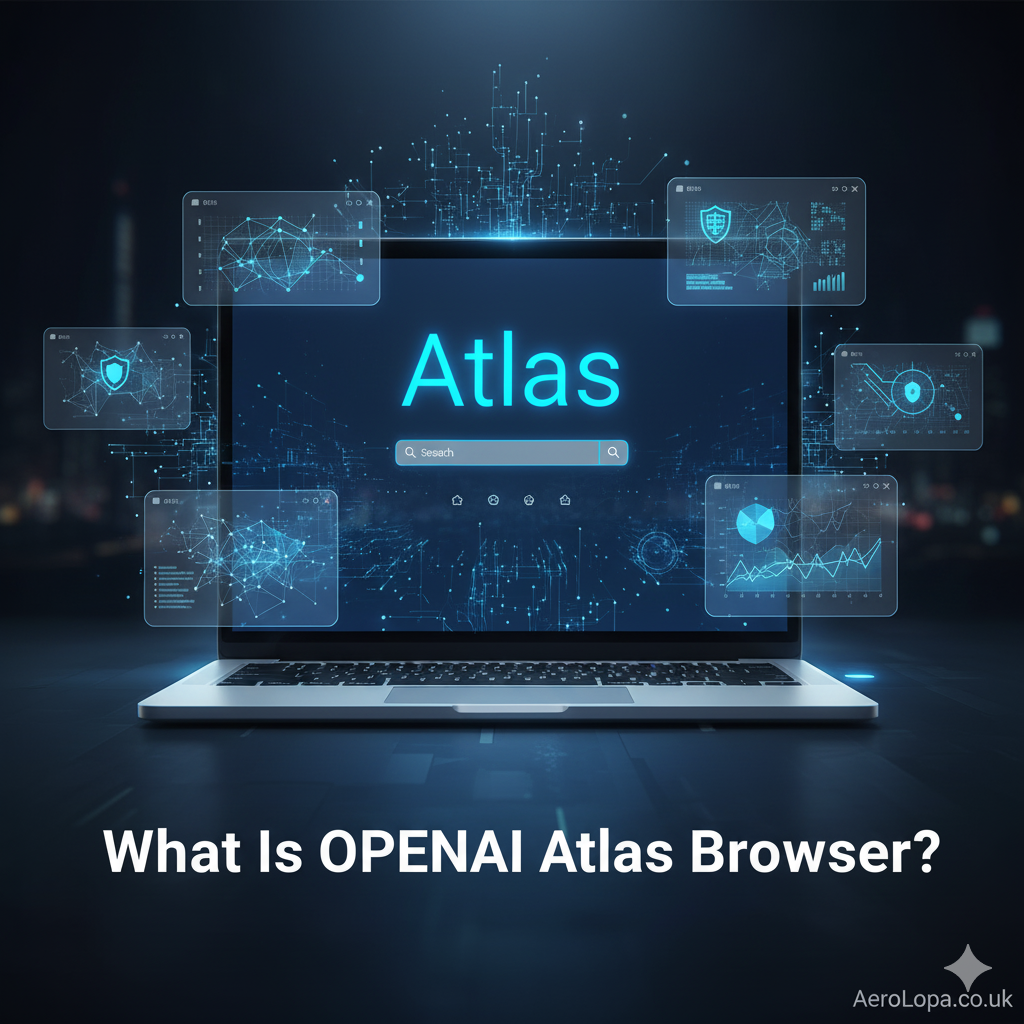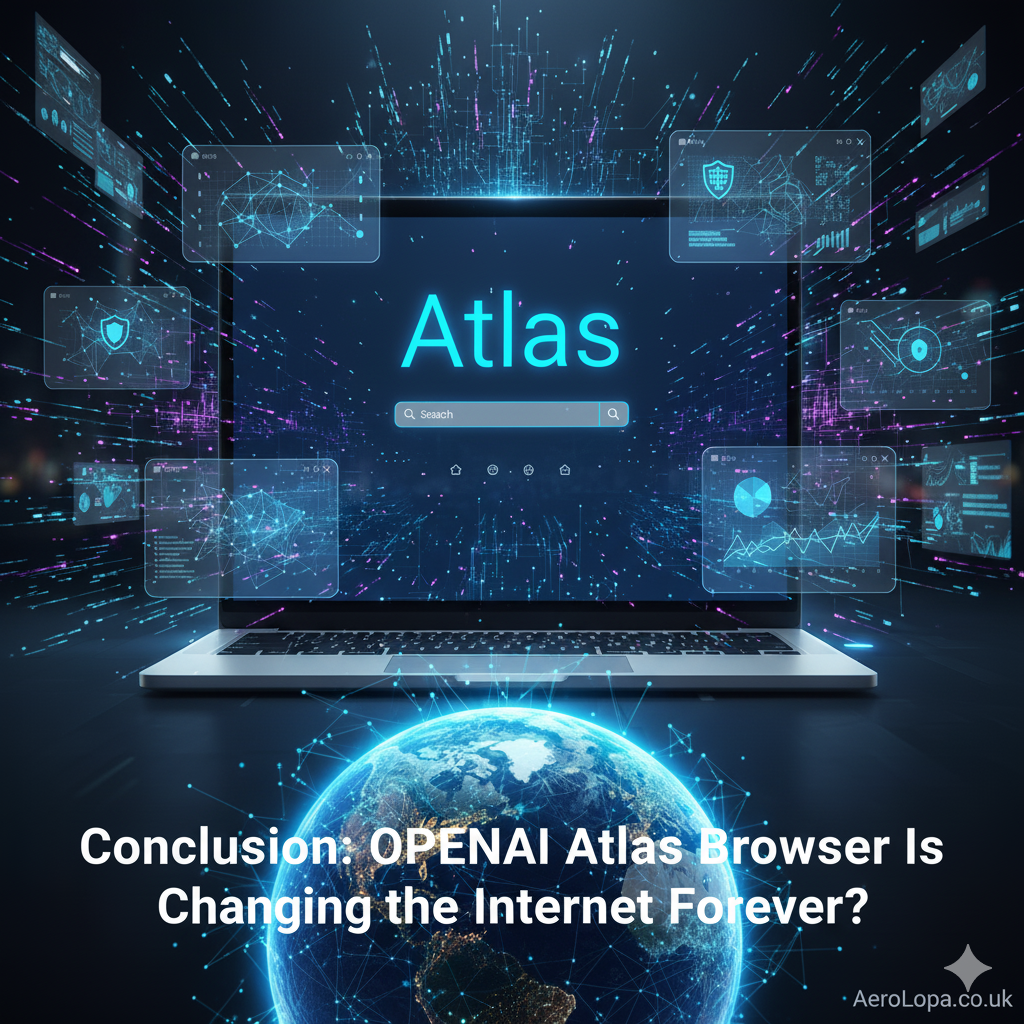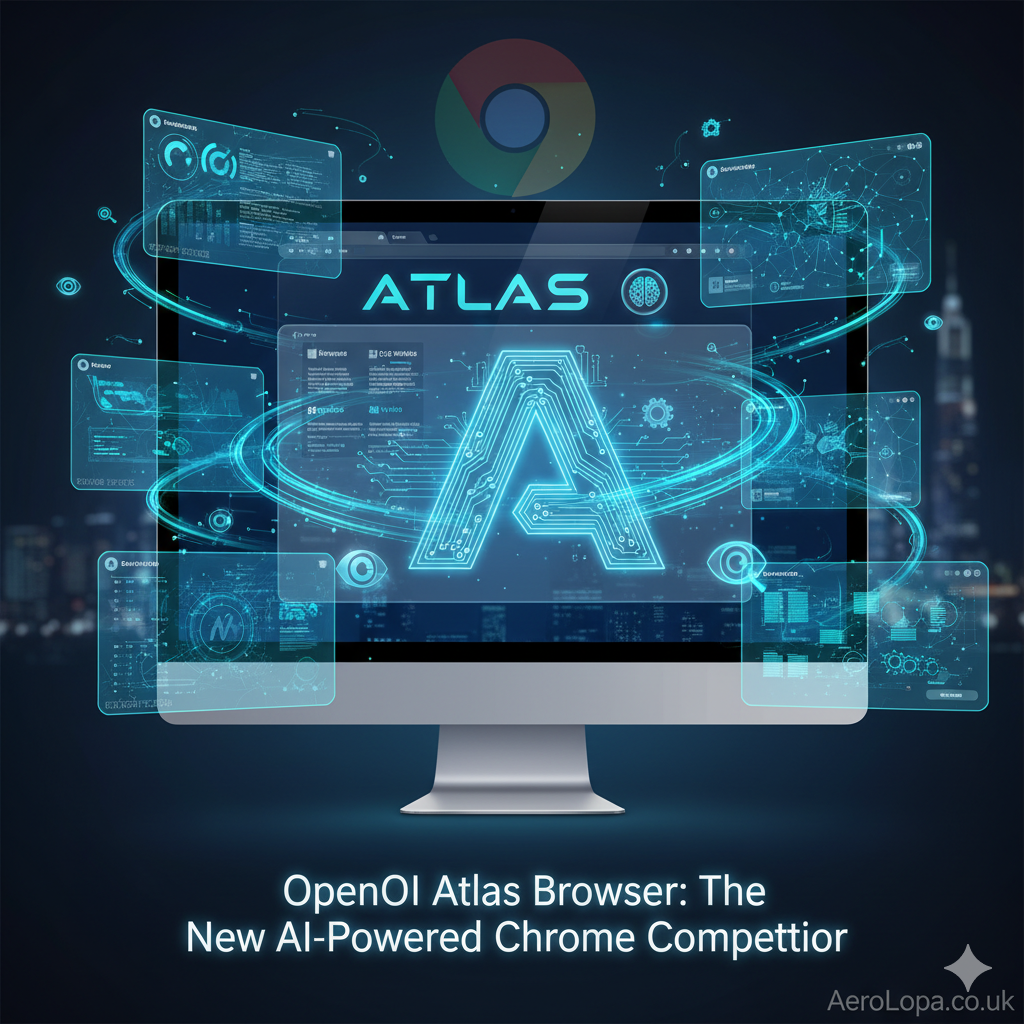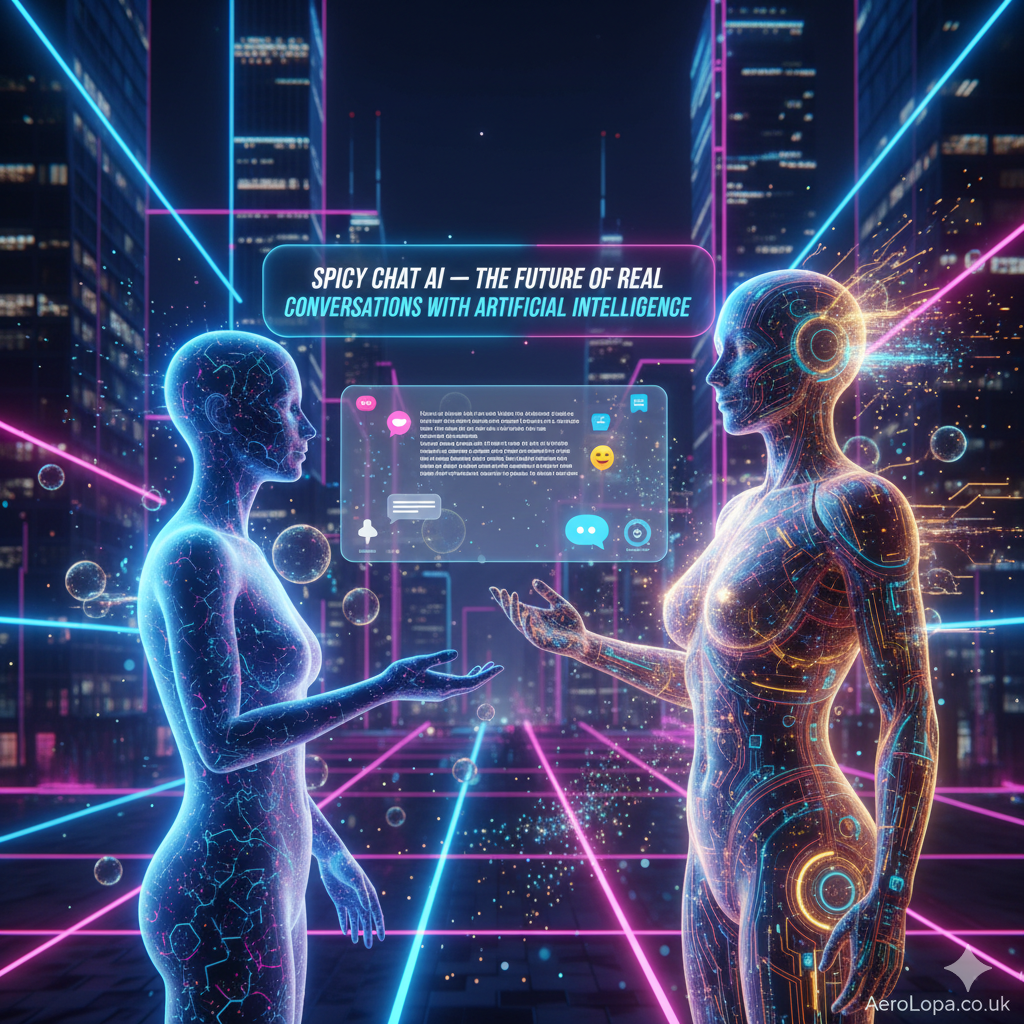Introduction: The Future of Browsing Begins with OpenAI Atlas
The internet is rapidly transforming, with OpenAI Atlas Browser at the forefront of that transformation. With AI at its center, Atlas is changing the meaning of ‘browsing’—intelligence, personalization, and efficiency are now blended in a way we haven’t seen before. The creators of ChatGPT have entered into the browsing space with the introduction of the OpenAI Atlas browser, putting it on the map as a competitor to OpenAI Chrome that caught the attention of users across the globe.
This article highlights everything about the Atlas web browser, how it would compare to Chrome and any other browsers and how it could change the way we use or engage with the Internet.
What Is OpenAI Atlas Browser?

The OpenAI Atlas Browser is the first web browser to be fully AI-enabled and enables you to use ChatGPT Atlas functionality from OpenAI (the people behind ChatGPT) in your browsing experience. ChatGPT Atlas can help you interact with web pages, summarize information, generate insights and help you get even the most advanced research tasks done in natural language.
Instead of searching the web like you typically would, Atlas enables you to think, read and act faster with contextual intelligence. Rather than just searching when you type or say your question, the browser will search, understand and analyze and provide you with the best answer immediately when you ask — that’s the power of Atlas.
Key Features of OpenAI Atlas Browser
- Integrated ChatGPT Atlas Assistant
Atlas comes with ChatGPT built right into the browser interface. This assistant helps you write, research, summarize, and even perform tasks like sending emails or coding without ever leaving your tab. - Search Engine Powered by AI
Rather than just traditional search engines, Atlas analyzes the results and summarizes the key points, highlighting the most relevant information instantly using AI. - Smart Reading Mode
Atlas recognizes articles, blogs, and PDF format content and presents a clean reading view free from distractions, offering real-time summary, translation, and fact check functionality. - Privacy and Personalization
Unlike data-driven browsers, OpenAI Atlas prioritizes user privacy. It learns from your behavior locally without selling or sharing data, making it both intelligent and secure. - Cross-Device Sync with AI Memory
Whether you switch from laptop to phone, Atlas remembers your context — tabs, tasks, and even ongoing conversations with your AI assistant. - Visual and Voice Interaction
You can speak directly to your browser or use screenshots, documents, and images as prompts for ChatGPT. Atlas understands context from visuals and text together. - Intensive Integration with OpenAI Network
The browser works perfectly with ChatGPT Plus, ChatGPT-5, DALL·E, and Codex, providing a superapp for creativity, productivity, and exploration.
How OpenAI Atlas Browser Works
The Atlas web browser is built on an intelligent framework that combines standard web technologies with advanced AI models. When you visit a page, Atlas doesn’t just display content — it interprets it.
For example:
- Searching for “best laptops 2025” will return not only web results but an AI-generated summary comparing top choices, user ratings, and expert reviews.
- Reading a long research paper? Atlas automatically creates a smart summary highlighting key points and definitions.
- Shopping online? Atlas compares prices and provides recommendations based on verified sources.
Everything happens inside the browser interface, no plugins required.
Why OpenAI Atlas Could Replace Chrome
Since Google Chrome’s release in 2008, it has dominated the browser market. But after 17 years, innovation had slowed — until now. The OpenAI Atlas launch introduces features that make Chrome feel outdated.
Here’s how Atlas vs Chrome compares:
| Feature | OpenAI Atlas Browser | Google Chrome |
|---|---|---|
| Built-in AI Assistant | Yes (ChatGPT Atlas) | Limited (Gemini integration) |
| Smart Summarization | ✅ Auto summaries for pages | ❌ Manual extensions needed |
| Voice + Visual Input | ✅ Natively supported | ⚠️ Partial |
| Privacy Protection | Strong, AI-localized learning | Weaker, ad-driven model |
| Research Assistance | Full AI-driven results | Search-dependent |
| Content Creation | Integrated GPT tools | External tools needed |
| Speed Optimization | Adaptive with AI caching | Traditional caching |
With AI handling most tasks, Atlas is not just a browser — it’s a digital co-pilot.
Benefits of Using the OpenAI Atlas Browser
- Smarter Workflows:
From students writing papers to professionals doing market research, Atlas speeds up everything through AI automation. - Better Search Results:
No more browsing through dozens of links — Atlas filters the web intelligently, showing you the most trustworthy and relevant information first. - Efficient Reading Experience:
AI highlights what matters most and even explains complex terms. Perfect for learning and productivity. - Seamless ChatGPT Integration:
Type or speak naturally to get answers, generate content, or perform actions across websites. - Secure Browsing:
OpenAI promises top-level data encryption and ad-free browsing, protecting users from trackers and data profiling. - Productivity Boost:
Atlas can generate summaries, code snippets, blog drafts, or even entire documents based on what you’re viewing — all within your tab.
ChatGPT Atlas: The Heart of the Browser
The ChatGPT Atlas module is what makes the browser revolutionary. It acts as your AI companion, always ready to help.
You can ask it to:
- Explain a web page
- Generate an email draft
- Rewrite text professionally
- Create a marketing plan
- Debug code
- Summarize PDFs
- Compare products or services
Essentially, ChatGPT Atlas turns your browser into an all-in-one AI workstation.
OpenAI Atlas vs Traditional Browsers
Unlike traditional browsers that rely on search engines, Atlas interprets the web. It transforms static pages into interactive experiences by providing:
- Live explanations
- Instant data visualization
- AI-powered notes
- Contextual translation
It’s like having ChatGPT and Chrome combined — only smarter.
The Vision Behind OpenAI Atlas Launch
OpenAI aims to make AI not just a chatbot but a daily companion for web users. The Atlas browser represents this vision — bridging the gap between humans and the digital world through understanding, reasoning, and intelligence.
Sam Altman, CEO of OpenAI, has characterized Atlas as “a browser that helps you think”, and it is meant to augment human ability, not supplant it.
Additionally, it acts as a pushback against Google’s monopoly on search and browsing, and may even change how billions of people use the web.
Who Should Use OpenAI Atlas?
- Students and Researchers who need fast comprehension of large data.
- Writers and Marketers looking for AI-powered productivity.
- Developers and Designers who want intelligent coding and creative tools.
- Everyday Users seeking privacy, speed, and a smarter browsing experience.
In short, anyone who browses the internet will benefit from Atlas’s AI-first approach.
Future of Browsing with AI
The OpenAI browser is a glimpse into the future of the internet — one where users interact directly with intelligent systems that understand context, emotion, and purpose.
Within a few years, AI browsers like Atlas could replace conventional ones completely. Instead of typing searches, you’ll simply talk to your browser, and it will deliver exactly what you need — summarized, verified, and ready to use.
Conclusion: OpenAI Atlas Browser Is Changing the Internet Forever

The OpenAI Atlas Browser isn’t just another app — it’s the next stage of human–AI collaboration. With the ChatGPT Atlas assistant, intelligent search, and deep personalization, it gives users the most powerful, private, and intuitive browsing experience ever created.
Whether you’re a casual web surfer or a digital professional, Atlas offers something no other browser can: an AI that understands you.
In the coming years, we may look back at the OpenAI Atlas launch as the moment the internet changed forever — when browsers became thinkers, and searching turned into understanding.


